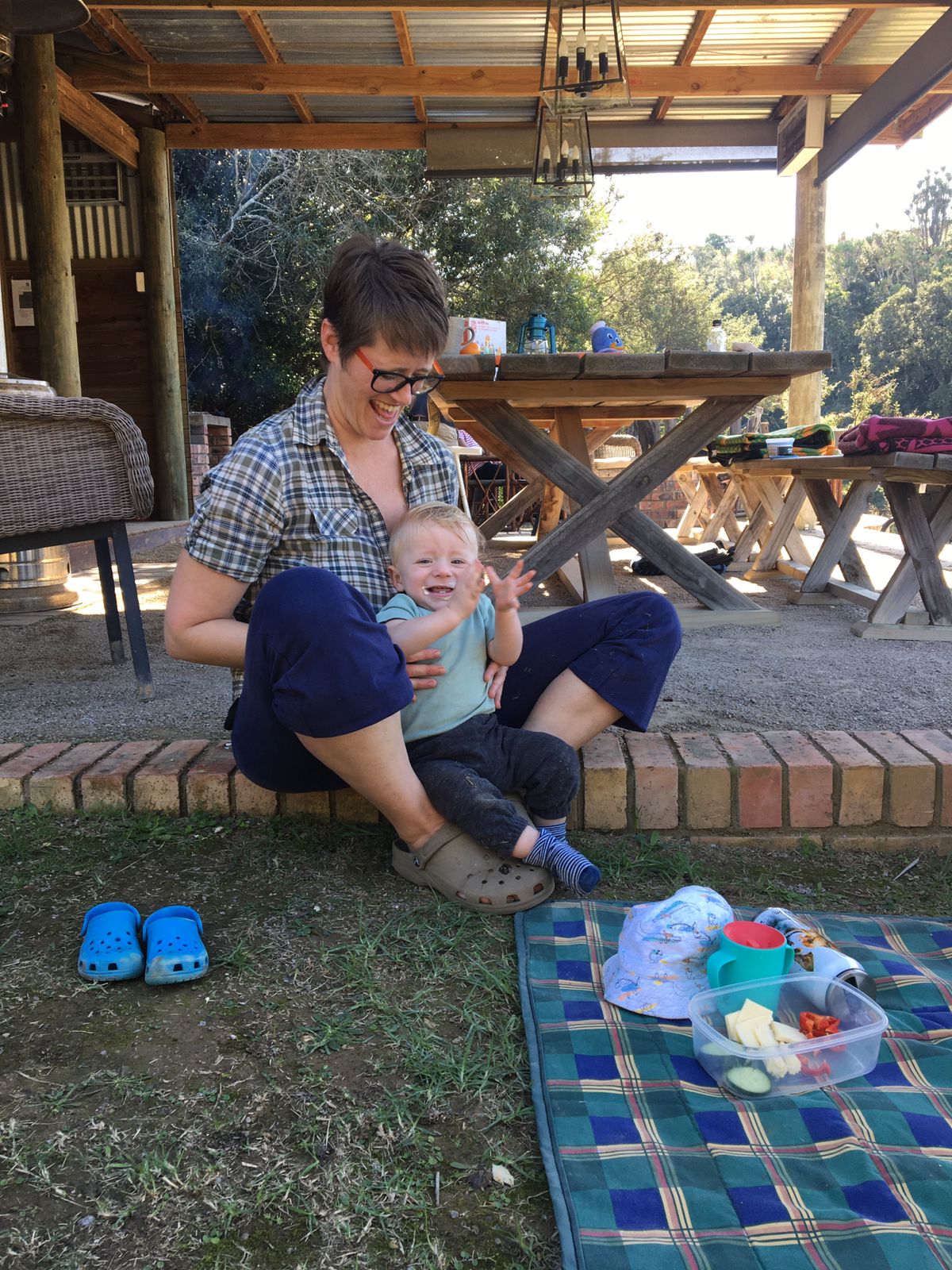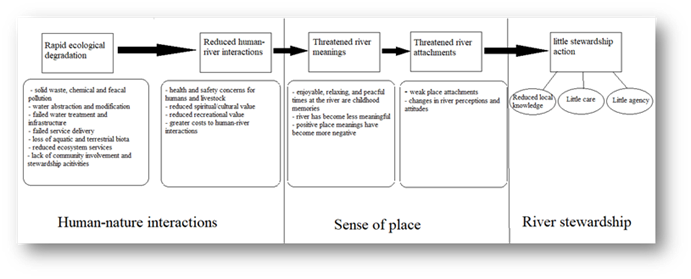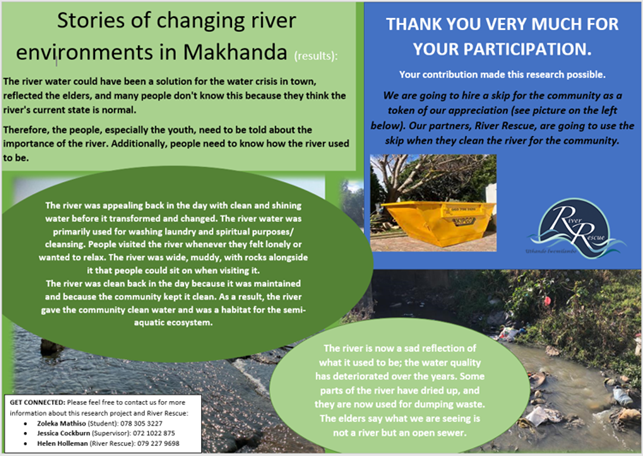28
JUNE, 2023
By: Jessica Cockburn
[email protected]
072 102 2875
Senior Lecturer in Department of Environmental Science, Rhodes University

William Wordsworth
Hello fellow friends of River Rescue. I’m writing to share my experiences as an academic working with River Rescue over the last few years. In reference to the quote above: nature, through the Matyana (or Bloukrans) river and the people of Makhanda who care for it, has become one of my most significant teachers. I have been working alongside River Rescue since 2021 and have participated in River Rescue activities as a community volunteer since 2020 (Though less actively so since I became Mom to our precious baby boy, Jonah, in April 2022! And yes, we use cloth nappies for Jonah, most of the time!)
I was invited to share some reflections on my experiences of teaching, learning and researching with River Rescue by Helen Holleman. This was prompted by my sharing with her some of what I presented at a Keynote Presentation at the recent Rhodes University Community Engagement (RUCE) Learning Symposium held at Amazwi from 9–11 May, 2023.
Community-university partnerships can enrich and enliven our academic work, both in teaching and learning (where we engage with students to build the next generation of environmental scientists) and in research (where we build new environmental knowledge with and for society).
River Rescue and the local Matyana River have become increasingly important in my work as an environmental scientist. To be able to ground my teaching and research in a real-life case study in my own town has helped me to become a better teacher and researcher. It has helped our students to learn about the very messy realities of community-based environmental activism. If you’ve ever showed up to clean the Matyana river flowing through Makhanda, you’ll know just how very messy that is: sewage, nappies, broken shoes, plastic bottles, sewage, glass bottles, toothbrushes, couches, washing machines, sewage, chip packets, sanitary pads, sewage, dead dogs, mattresses, deodorant cans, tyres, wire, broken dolls, sewage… the list goes on, and on, and on.
Look at that list: isn’t it ironic how many of the items there are things we use to keep ourselves and our homes clean? And they end up making the river filthy? When we throw things away, they never really go away, do they? And notice how the sewage keeps coming: it really does. What can we do about it? How can we expect people to live alongside this filthy river, now more like a waste canal or ditch?
These and many more reflections and questions have come up in our teaching and research activities. There are two main ways in which I integrate River Rescue into my teaching and research.
Firstly, through a service learning module which we teach in our Environmental Science Honours course. In this module the students become River Rescue volunteers for a few months, and then implement a mini-project to contribute to River Rescue activities. They co-develop this mini-project with River Rescue. They are expected to reflect on their experiences, developing their own reflective practice and skills, and linking the practical experience to the theory on complex social-ecological systems and sustainability which they learn in the classroom.
The second thing I have done with River Rescue is to develop research projects for Honours students to conduct alongside River Rescue, which I supervise. The idea here is for the students to conduct engaged, action-oriented research in partnership with a local environmental organisation and the local community. I’ve supervised three Honours projects so far focused on River Rescue; this is what they have worked on:
Alexandra Collett (2020): Sense of Place and River Stewardship in Makhanda
Zoleka Mathiso (2021): Exploring and mobilizing local indigenous knowledge about changing river ecosystems through stories
Markan Nkhwazi (2023): Relational Values: A Comparative Study on Community-Based Voluntary River Stewardship in The Eastern Cape and Gauteng.
Below are brief visual summaries of the main findings of Alex and Zoleka’s research. Markan’s research is still underway. If you’re interested to read their research reports, please contact me.


I have also participated in a research project on developing citizen science tools for spring monitoring, in which we worked in collaboration with River Rescue and the Tsitsa Project to learn with community partners what they most needed to better manage and monitor their springs. This project was led by River Rescue governing board member, Nosi Mtati.
We have learned, and continue to learn, so much from these experiences. Some of these reflections are captured in the images below.


It hasn’t always been easy though… the filth of the river, the dysfunction of the municipality, the physical revulsion and sometimes sickness one feels when working in the filth, the feelings of overwhelming futility when one cleans the river just to find it full of rubbish again just a week or two later… these are not easy experiences and topics to grapple with. And they certainly test me as a teacher and scientist, because I have to admit that I don’t have all the answers; that I too can feel overwhelmed and unsure at times about what to do and how to move forward. And I have had to dig deep sometimes to support the students through difficult emotions and conversations.
But if we are serious about developing relevant knowledge, skills and competencies for the next generation of environmental scientists, and if we are committed to generating new and relevant knowledge to address our most pressing sustainability and social justice issues, then it is into the muck and uncertainty that we must step. In so doing, we must reflect on what we are learning and what this means for our role in society and our future as humans on this precious planet. And importantly, we must then turn reflection into bold and collective action.
I am deeply grateful to Helen, Elizabeth, Zomzi, and all the other wonderful River Rescue heroes! You inspire us all to keep going! Most recently, thank you also to the National Arts Festival and their amazing Social Employment Fund (SEF) teams who have been cleaning our rivers and streets. Thank you also to the DES Honours Students over the last four years who have rolled up their sleeves, pulled on their red gloves, pushed their feet into their borrowed gumboots, and showed up to care for a sick river in their university town. And to Alex, Zoleka and Markan, for taking on the challenge of conducting meaningful research in this challenging context. Your commitment to keep showing up, despite (or because of?) the filth, uncertainty, and overwhelming nature of the challenge we are tackling, give me HOPE! And that is a precious gift and source of renewal, energy and motivation. Let’s keep moving and flowing, like the river, our greatest teacher!
